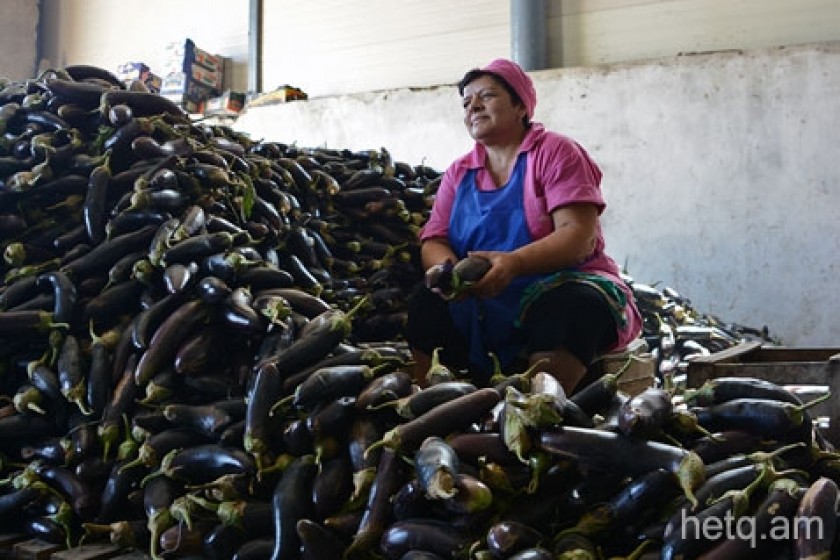
Photo Story: Russia is Largest Market for Artsakh Fruit and Vegetables
Russia is the largest market for the goods produced by the Republic of Nagorno-Karabakh's Artsakh Fruit CJSC. Apart from the local, Artsakh market, since its founding in 2008, the company's goods have been exported to France, Hungary, Ukraine, Kazakhstan, and Dubai.
Upon entering Artsakh Fruit's Stepanakert factory, one doesn't manage to recover from the outdoor August heat, as striking your face is the wave of hot air from ovens more scorching than the sun, leaving behind the sweet aroma of cooked, barbecued, and fried vegetables and fruit that whets your appetite.
The women in pink uniforms first sort then skillfully clean, cut, and process the vegetables and fruit, which results in the company manufacturing 28–30 types of products per year.
Whoever comes to this factory at least once will recognize 84-year-old Ella Martirosyan, who has been working at Artsakh Fruit for 7 years. Though her eyesight is poor, she peels several cases of onions and garlic per day.
Speaking to Hetq, the company's head of production, chief technologist KarineHakobyan, said that around 100 workers. 95 of whom are women, including pensioners, currently work in the factory.
"As soon as the season opens, we increase the number of employees, while in the winter months, depending on the orders, we leave 20–25 employees of our old staff," Hakobyan explains.
Salaries are paid according to the work done; that is, by piece work. Furthermore, the salaries of those working after work hours (after 6 pm) increase by 15–20%. Hakobyan explains that the most difficult work is done by those working after 6 pm.
A teacher by profession, MelanyaBabayan often stays until 9 pm. Asked if she doesn't get tired, Babayan, showing the varicose veins on her legs, confesses, "Of course I get tired, but what other choice do I have? I'm raising 3 children on my own and I need the money. It's impossible to meet the needs of 4 people on a teacher's salary. For four years I've been earning my daily bread with seasonal work here."
Despite the difficulty of the work, Babayan doesn't complain. Moreover, she's happy that at least she has this; otherwise, it would be impossible to survive in this climate of daily increasing prices.
In the half-hour period during which Hetq was photographing the factory, vehicles loaded with vegetables were unloading one after another. Asked whether all the produce was local, Hakobyan said that preference is given to the local, but first, it's not always that local producers are able to provide the necessary quantity and second, there are types of produce, such as apricots, that Armenia exports. The picture is different in the case of the consumer market.
[gallery id=166]
 Videos
Videos Photos
Photos




Write a comment